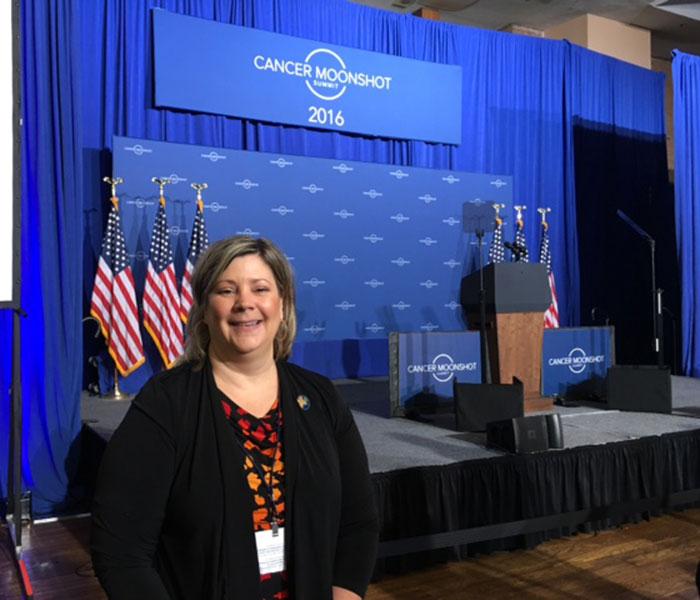I was elated when I received an invitation to attend the Cancer Moonshot Summit in Washington, DC, on June 29, 2016. I was pleased with the fact that nurses were viewed as real stakeholders in this initiative. After all, we are the ones who are closest to the patients and understand what they need. We understand what stumbling blocks they encounter throughout their cancer journey and how it changes their and their families’ lives.
I wasn’t sure what to expect at the summit. I learned that five other ONS members had been invited as well as ONS president, Susan Schneider, PhD, RN, AOCN®, FAAN, and ONS Chief Executive Officer, Brenda Nevidjon, RN, MSN, FAAN. We did receive an agenda of the speakers, and I needed to google them all. I even listened to some TED talks from the speakers that were presenting. Yes, I like to be prepared, even though I hate to admit that out loud, let alone on a blog.
If you’ve not heard, the goal of the Cancer Moonshot, according to Vice President Joe Biden, is to “Double the rate of progress toward a cure – to make a decade of advances in cancer prevention, diagnosis, treatment, and care in five years.” I think this is a lofty goal, but one that is attainable with collaboration, communication, hard work, and resourcefulness.
Carol Burnett and Vice President Biden, who were both there, shared something that no parent wants to share—they both lost a child to cancer. When Burnett heard of the Moonshot initiative she said she knew that she wanted to help. Two of her talking points describe how her daughter handled her diagnosis with these thought’s, “Today, I am going to love my life,” and “Hope means everything.”
Vice President Biden presented with passion and optimism. He admitted that the government needs guidance and direction from the experts to propel this goal. He has a very high regard for nurses and that was clearly stated in his opening speech.
Some of Vice President’s Biden’s thoughts from the Cancer Moonshot Summit Speech:
- Time Matters, Days matter, Minutes matter
- Urgency of now, breakthrough to propel us forward
- Increase collaboration, link genomic data and improve reporting efforts
- Reclaim incentive for research and reward teamwork
- Generate, share and integrate data
- Prevention strategies, liquid biopsies and screening into communities
- Improve EMR so that they can talk to each other
- Transform cancers into chronic and managed treatments
- We need to work together
After Vice President Biden’s opening remarks, the 350 attendees were divided into smaller groups and tackled some of the following issues:
- Strategies for Integrating Advances in the Cancer Treatment into Cancer Care
- Putting the Patient at the Center of Access and Care
- Disparities in Cancer Care
- Incentivizing Breakthrough Research Discoveries in Cancer
- Imagining a Fully Connected Cancer Healthcare Continuum
In each session the focus began with looking at the issues related to the topic, followed by brainstorming and proposing a plan of action. An example from one of the sessions discussing Putting the Patient at the Center of Access and Care included:
- Looking at relationships
- Think beyond the diagnosis
- Patient research is not a threat
- Varying models of navigators
Some of the ideas that spurred from that conversation included:
- Assign a navigator to patient on day one
- Holistic approach
- Patients in a leadership role
- Single nationwide system of medical records
- Remote access
- More robust psycho/social care
This is just a glimpse of what was discussed at the summit. Moving forward at a fast pace is what the goal of the Moonshot is, but we need to take a moment and ensure that we are moving at a safe pace. We all want to eradicate this terrible disease but as providers, researchers, and nurses, we are obligated to collect, translate data, and change practice to ensure a culture of safety.
As care providers, nurses need to remain vigilant in confirming that we stay on the course of the Moonshot, while still ensuring that our patients remain safe. We must continue to have culture of safety in the forefront of our minds.






